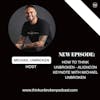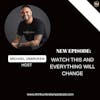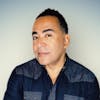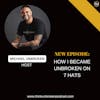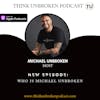Reclaiming Power: Rising Above Abuse and Rebuilding Your Life
In this episode, I am the guest on the Rise Up For You Podcast, hosted by Nada Nasserdeen. Join us as I delve deep into the connection between mindset and reality... See show notes at: https://www.thinkunbrokenpodcast.com/reclaiming-power-rising-above-abuse-and-rebuilding-your-life/#show-notes
In this episode, I am the guest on the Rise Up For You Podcast, hosted by Nada Nasserdeen. Join us as I delve deep into the connection between mindset and reality, offering practical strategies and thought-provoking perspectives. Discover how a positive mindset can shape your experiences, relationships, and overall success. Through captivating anecdotes and real-life examples, I will illuminate the path towards a more fulfilling and purpose-driven life.
************* LINKS & RESOURCES *************
Learn how to heal and overcome childhood trauma, narcissistic abuse, ptsd, cptsd, higher ACE scores, anxiety, depression, and mental health issues and illness. Learn tools that therapists, trauma coaches, mindset leaders, neuroscientists, and researchers use to help people heal and recover from mental health problems. Discover real and practical advice and guidance for how to understand and overcome childhood trauma, abuse, and narc abuse mental trauma. Heal your body and mind, stop limiting beliefs, end self-sabotage, and become the HERO of your own story.
Join our FREE COMMUNITY as a member of the Unbroken Nation: https://www.thinkunbrokenacademy.com/share/AEGok414shubQSzq?utm_source=manual
Download the first three chapters of the Award-Winning Book Think Unbroken: Understanding and Overcoming Childhood Trauma: https://book.thinkunbroken.com/
Join the Think Unbroken Trauma Transformation Course: https://coaching.thinkunbroken.com/
@Michael Unbroken: https://www.instagram.com/michaelunbroken/
Follow us on TikTok: https://www.tiktok.com/@michaelunbroken
Learn more at https://www.thinkunbrokenpodcast.com
Support this podcast at — https://redcircle.com/think-unbroken-with-michael-unbroken-childhood-trauma-cptsd-and/exclusive-content
Support the Podcast: Become a listed sponsor!
Follow me on Instagram @MichaelUnbroken
Learn more about coaching at https://coaching.thinkunbroken.com
Get your FREE copy of my #1 Best-Selling Book Think Unbroken: https://book.thinkunbroken.com/
Nada: Hey, everyone! Welcome to the Rise Up For You Podcast. This is your host, Nada Nasserdeen, super excited to be here today with an amazing guest and also a friend, and we're switching it up a little bit, we are in person today in Las Vegas, so I'm super excited to bring our guest known as Michael Unbroken. Thank you so much for joining us today.
Michael: Yeah, of course. What's up my friend?
Nada: What's up? And I'm actually in his podcast studio, just so you know, so if you've seen the podcast where I'm being interviewed by Michael, we are in the same space, but super honored to be here. I always love to start the podcast off by letting our guest introduce themselves in their own words. So, brag a little bit, share a little bit about what you do before we jump in.
Michael: Yeah. Well, I'm an author, speaker, coach, podcast host, you know, those are the highlight reels. But ultimately, I think I'm just a person who tells the truth and in that help people.
Nada: Yeah. I love that we had the opportunity to meet at an event a couple months ago where we both spoke on stage. And I heard your story, which is freaking amazing and if you're okay, I'd love for you to share with the audience kind of your journey and how you got to where you are today, because I think the things that you are addressing and talking about are needed now more than ever on every level I would say as children, youth, I would say in communities and homes, and even in the workplace. So, if you're cool with it, tell us your journey, raw share what you can.
Michael: Yeah. And I always say this as a precursor don't compare your journey to mine. We all have a different one. We all come from different circumstances. And I think one of the really hard parts about what I do is people will hear my story and they'll go, oh, mine wasn't that bad and it's like, it doesn't matter like, your sh*t and my sh*t are not the same. Right? And so, we can go as deep as you want to go with how I lay this out so, nothing's off the table. When I was four years old, my mother, who was a drug addict and alcoholic, actually cut off my right index finger and so multiple surgeries, multiple skin grafts, it's still partially there. But she, like many people, was a hurt person and she just continued to perpetuate that and our family and our lineage. So, when she married my stepdad when I was six, he was super abusive, the kind of guy you praise is never your stepfather. He is guy six foot 4, 220, like my size and you know, beating up a seven-year-old, putting me in the hospital. So, you can imagine just the chaos and the amount of tumultuousness, that's even a word of my household. And so, from eight to about 12, we were just in massive poverty and I live with over 30 different families in that window getting bounced around place to place to place strangers, vans, church people, family members, I never really knew. One of my brothers got put into a group home, my grandma adopted the other one, my sister's dad took her. And I was just kind of like this kid, like getting bounced around everywhere. And in fact, when I was like 11, I lived in an abandoned house for six weeks by myself like going to the corner of 30th and Georgetown and Indianapolis and stealing food from the big lots over there. Right? And so that's kind of like the high-level framework of just those first formative years. Luckily, and maybe unluckily in a lot of ways, I got ado adopted by my grandmother when I was 12. And like I'm biracial, black and white, and my grandma's an old racist white lady from a town in Tennessee you never even heard of so, imagine now I'm having this identity crisis, right? We can't have black friends in my house. My uncle's a part of the Arian Brotherhood, we haven't had a copy of Hitler's autobiography, mine comp in our house like that tells you anything. So imagine how absolutely f*cking insane that is.
And so, by the time I'm 12, I start doing drugs, smoking weed, popping pills by 13 drinking and by 15, I got kicked outta school for selling drugs. So, I'm living into really a lot of the communal expectation and societal expectation people had on me. And when you look at a lot of statistics, your zip codes a better indicator of success in youth than almost anything. It's unbelievable. And in fact, the high school I went to is has been defunded and closed down. It's called a dropout factory. So, I get kicked outta high school, end up not graduating, they literally give me the diploma and they go; we're done with you. Let the streets figure you out. And, and I was like, okay, well I guess this is my life now. And at 18 I just started going down this path, at 18 I get kicked outta school and I'm in this job where I am putting microchips into motherboards all day in a warehouse, and I got fired and I'm sitting in my car and I'm like, okay, what's the solution for all this? What's the solution for poverty, for homelessness, for abuse? I was like, it's gotta be money. What else could it possibly be? It's gotta be. And so, I made a decision. I was like, by the time that I'm 21, I'm wanna make a hundred thousand dollars a year legally. And that part was super important. I have family in prison for life, my three childhood best friends have been murdered, and I've been in handcuffs more times than I can count. And so that's the path I took and I end up, by the time that I was 25 working in corporate America, I made almost a million bucks.
Nada: Thank you for sharing. I have lots of questions that I wanna ask you, but you know, you talk about your journey, you got your diploma, they just handed to you basically said like, go figure yourself out. But did you have any mentors, any modeling, any influential figure at that time that got you to have that thought of, well, lemme go do a job and make a hundred thousand dollars illegally like, how did you even get to have that mindset opposed to, well, I'm on my own, so I'm gonna do it the way I gotta do it the streets way, like how did you get, how did that happen for you?
Michael: Well, so a couple of things happen. One, like Jay-Z will always be my first mentor, right? And so, I spent a lot of time just like consuming his content and just being like, there's a way out of this, I don't know what it is, but I'm gonna find it. And then the other side of it is I played sports, I wrestled, I played football, I played baseball when I was eligible most of the time, I wasn't but when I was, I did really well. And I won a bunch of tournaments and a bunch of championships in the various sports captain of the wrestling team captain, co-captain of the football team until I got kicked off again. And so in sports I learned a lot about discipline. But it was a couple of my teachers and I always shout them out Mr. Hollingsworth, particularly who one day he just sat me down and he's like, dude, you're not supposed to be here. You're arguably the smartest kid I've ever had. You are driven. You are in a circumstance; you don't have control over. You need to figure out how to get out of this. And out of this, meaning this school, this neighborhood, this community. And so my girlfriend had called me when I was at home, I was stoned playing video games and she's like, hey, they put out the graduation list, you know, they put everybody's name on the list at the end of the school year, so who's graduating high school? She's like, your name's not on the list. And I was like, yeah, I'm not surprised by that. So I went to school, I went to Mr. Bush's classroom, second floor corner of the building, I wait for the period to end. He comes out and I go, how dare you fail me? Like I'm so mad at this dude, just pissed. I go, how dare you fail me? Like being this ornery 18-year-old. And he goes, I didn't fail you, you failed yourself. And then he told me the most important thing any to this day, no one's ever said anything more important than this one thing he told me. He goes, you need to understand something about life. If you want something, you have to earn it. You can't get by on your charms and your good looks. And so that forced me to go to summer school and I was really, really, really embarrassed, all of my friends uninvited me from every party, my girlfriend was embarrassed of me. I'm the laughing stock of the, it's almost impossible not to graduate this school ‘cause they just pass everybody. And so, when I'm in summer school and they just gimme the diploma, like it doesn't even count. I had straight F's and I missed a hundred days of school. He was just like, dude, you're gonna get murdered in the streets. Good luck. That's effectively what he was telling me. And so, I got fired from this job and I'm sitting in my car and I'm just reflecting on all the things these people had been telling me and they were like, you are supposed to be doing something different, something better. And like, I felt this in me too like as a kid, I will never forget just being like, I'm supposed to be a f*cking rockstar. Like really, that was like the thing that I'm like, I'm supposed to be Jay-Z or like the Foo Fighters that's what was in my head.
Nada: And so that's a big difference to people.
Michael: Yeah, totally. Well, I know that the thing I'm supposed to be doing in my life isn't what everyone else is doing. I've always been an outlier. I've always been an outsider, always been the kid that got picked on for being different, I was the first person I knew who was tattooed, you're the first person with the nose ring. I was the first person to go the alternate route and start a business, and I was just, I don't want to be told what to do, especially via circumstance and so, part of it also is you have to know yourself.
So, and I will say I know myself more completely today than I did 20 years ago. But 20 years ago, I knew I was stubborn and I believed I was, one of the things I worked with Tom Bilyeu for a lot of the last seven years of my life, having dinners with him, spending time with him and Lisa, like consuming the podcast, going on trips and meeting him in different cities, blah, blah, blah. And he talks about this concept of the arrogance of belief. And I've always had this, I've always believed I could do stuff to the point of where it's borderline arrogance where people are like, dude, you are so full of yourself. And you know, the same thing I always teach my clients is this. I go, if you don't believe in yourself, who will?
Nada: I call that self-confidence? And it's interesting how you phrased it, but it seems that you always knew that there was some deeper potential in you. Right. And so where do you think that came from? Because you know that we talk about confidence a lot here at Rise Up For You. It's the number one it's the biggest challenge for professionals, not just in the US but globally, is having self-confidence and a little bit different than kind of how what you're saying is that most people, when they go through a situations, even if it's not traumatic, even if it's just a teacher says something to them, or they go through a breakup, it impacts their belief system about themselves tremendously, where they can't take action, they don't believe in their ability and it keeps them stuck. And in your case, it kind of did the opposite where you used your pain as feel for growth and even when you went through all of this stuff that I would say made you feel like. Who are you? Where are you going? You still seem to find that center ground of self-confidence within yourself. Where do you think that came from? Or do you think it was just innate in you?
Michael: Well, look, I've not always been confident. In fact, my confidence has wavered like anyone's like. I don't think anyone's ultimately confident. I lose confidence when business deals don't go right. When I go through a breakup. When I have to close a business. When a friend's relationship with me ends like I'm not always ultimately confident, but I am always willing to keep going. And that's the thing that I've always leveraged because like as a kid, I would, here's what the irony of what I'm about to say. When I was a kid, people used to call me coach and they would be doing it to talk sh*t. They would do it to make fun of me, and now people call me coach and pay me a lot of money to help them. But when I was going through this phase of transition in my early twenties, it was like, okay, here's the thing that I figured out was like, if I can zero in on this one goal and make that all of my focus, I can hit it. The problem with it is I didn't have enough clarity, so I said I wanna make a hundred grand a year. Well, what was the price I paid for that? Well, so by the time I'm 26, I've made almost a million dollars. I'm working for a Fortune 10 company. No high school diploma, no college education. This is almost impossible. All of my friends are like, don't ever quit this job. You'll never ha be this successful again. And then it was like last year, I was on a billboard in Times Square twice. So, I don't believe what people tell me that helps a lot. But I had to pay a price to get there.
I was 350 pounds, I was smoking two packs a day. I was drinking myself to sleep, cheating on my girlfriend. I was $50,000 in debt. My car got repoed. My little brother tells me, never talk to me again and I put a gun in my mouth. And it's like on paper you'll look at that and you'll be like, man, that guy has it all together, smoking hot girlfriend, $80,000 car, great condo, all the best clothes. I was a nightmare. I was a complete train wreck because I didn't have clarity and I didn't actually have confidence. I just had the drive towards something.
Confidence for me has been built in continually doing incredibly uncomfortable things consistently all the time. How do I put myself in a position to find out who I am by challenging myself to the unknown? And you hear people talk about this all the time. It's not like I'm saying anything. No one's ever heard before, but I got nuanced in it. Right. I mean, it's like how do I push myself even further than I think I'm capable of pushing physically, mentally, emotionally, spiritually, and it's been so much of a journey of acknowledging the failures and taking lessons from them and not beating myself up and knowing that on a long enough timeline, I will do everything I believe I'm capable of doing. It's just a matter of just showing up every day because it's like, I look at this career and many, like, a lot of times people like this guy is like the next Tony Robbins, or you know, people compare me to Goggins all the time or people will be like, you're one of the best speakers in the entire country. And I'm not saying those things are or are not true, that's the outside perspective. But what I know is like, I have the goals and the things that I want to accomplish, and whether they happen today or in 40 years, I don't care. I'm just gonna keep playing the game. And so that has allowed me to stay confident ‘cuz I'm not leveraging who I am and the way I feel about myself on the end. Because if I did that, f*ck, I'd be screwed because that's what I used to do. And so those paychecks would come in working for this corporation and then I'd be like, I'm gonna show people how much I like me. I'm gonna go buy them all drinks at the bar. I'm gonna take girls to $300 dinners. I'm going to buy clothes that I don't even want so I can impress people who don't give a sh*t about me ‘cause I had zero confidence, I just had a belief without clarity.
Nada: Yeah, that's interesting that you say that because we talk about like micro and macro level confidence, right? And the micro confidence being determined based off of like the external factors. The one thing that I hear you saying though was failure, like that you're not afraid to fail. And I wonder because even when we work with youth, it's so scary for people to fail, like they stay in the comfort zone because they don't want to have that failure or that rejection. Do you think that for you, failure was something that you weren't afraid of because you had already gone through so much crap in your life that did you ever have the thought of like, what could be worse than what I went through, so I'm just gonna go for it? Like how did you push through that failure?
Michael: That's entirely it. I'm like, the worst thing that's ever happened to me already happened. If I went dead, broken, bankrupt, I wouldn't care. I mean even like at 50 grand in debt, most people would file bankruptcy. I pulled myself out of it. I was like, I'm gonna figure this out. I don't want that. Right. And as a kid it was just like, I mean, good Lord we were so poor, they would turn our water off. I grew up in America, we were so poor, they turned our water off. We were so poor, I got evicted more times than I can count. I had to steal food to survive. My brothers and I got separated because my mom has a drug addiction and nobody knows where she's at. And you're gonna be like, I'm scared to get on stage real. Really? You are really gonna say that? And so it was like, no, I'm gonna face that fear. And so, it's not that I'm not scared cause I am like I will never be like, I'm not scared of the idea of failing cause I don't want to, but I'm not gonna be able to go to where I want to go ‘cuz it takes 99 failures and one win to accomplish your goal. And so I'm always like, well f*ck it. That one didn't work and that one didn't work and that one didn't work. I actually heard somebody Dan Savage, he hosted the Savage Lovecast podcast and he's the columnist for the Washington Post. And he said something that actually I heard about 10 years ago that I think translates into business in a really interesting way if you follow with what I'm about, about to say that I've leveraged constantly. He says “every relationship will not work until one does.” And that's how I think about everything I do in business. Everything I do is not gonna work until it works. And so if you can leverage that, and then you can kind of like create KPIs around why things didn't work and you have measurable data to be like, oh, that campaign didn't go through because we use this headline on this split test and we spent that amount of money to that audience and you can really get into the micro of it. Then you can start to really evaluate it and move through it, and I think that applies to everything in life, and so whereas most people will give up because they tried once. I'm like, I'm not, here's the thing, you don't lose if you don't quit.
Nada: It’s research. You're getting research basically all the times that it's not working, it's research for the time that it's about to work.
Michael: Yeah. And it's not gonna work most of the time.
Nada: Yeah. So I wanna go back a little bit because you do such incredible work, obviously empowering, motivating through speaking, but you do a lot of work around like healing and trauma. I wanna go back a little bit and just if you're open to this talk a little bit about your mom. I mean, obviously you went through a lot with that situation. Are you able now today to look at your mom? Not necessarily with forgiveness, but more through a lens of empathy and understanding like the human condition that so many people grow up as a product of their environment. And if they don't break the cycle like you are breaking the cycle, then they just continue to repeat the same patterns and pass them onto their kids and so on and so forth. Like when you think about the situation now, how do you view your mom? Do you still see her as somebody that hurt you? Or do you see her as somebody that was just going through a lot of pain and like, what's your perspective on it?
Michael: Yeah. I mean, this is the number one place where people are stuck. I teach my clients all the time. You're probably stuck because of your parents. And they don't realize it and we're meshed and groomed and ingrained into it to the point where we don't even see it.
When I was 18, I actually told my mother, I'll never talk to you again and I carried that through until the day she died because I knew the path I was going down. There's no way I'd be talking with you right now if my mother was still in my life. So, one night drunk and high again, she attacked me like I'd never hit my mom one time. She would beat the sh*t out of me. She would like lock me in closets like it was crazy. Like the thing, she threatened to kill us all the time. She would drink and drive and crash the car with us in it. And I never, ever, ever hit my mom one time until this one night where she comes to and she was like, off her rocker, wasted and is attacking me and I pushed her to the ground and I stood over her and I was like, if you ever touch me again, I'll kill you. And I meant it. And I told her, I said, I'm never gonna talk to you again, you're not my mother. She always picked drugs. She always picked alcohol like, I have to carry these scars on my body from her decisions. And at 18, making that decision was very difficult. But I knew that it was the choice that I had to make for me, and that was a boundary. I didn't have that word then, but I could just see the future. I could see the future. Fast forward to the day she dies. My brother calls me and he's like, hey man, mom died and I'm like, I think I'm 23 or 24 and I go, okay, cool. Have a great day. And I hung up the phone. And I felt the greatest sense of relief I've ever felt in my whole life. Freedom. Freedom from all that torment, all that suffering. It doesn't mean it didn't impact me. Let me be very clear about that. Doesn't mean it didn't mess me up in relationships, in worthiness, in love, in mental, emotional, physical, spiritual, sexual connections with other people like it took a lot of work to get to where I am today to be able to connect with human beings. When I was like 31, it was sitting in my therapist's office and I remember being like, Daniel, I don't wanna be here. I'm tired of being in the same stupid room, drinking out of this same dumb cup, sipping this same stupid tea, looking at your stupid face. This is literally what I'm telling him. And I'm like, he's laughing, I'm laughing, but he gets it right? And he goes, yeah, I get that. He goes, I'm mad I'm over. I go, I'm over fixing other people's problems. He goes, I understand. And then he said something to me that really changed the way I think about almost everything. He goes, I just want you to pause for a moment. He's not like taking away this moment from me. He goes, I just want you to pause. I want you to think about what it was like for your mother and her childhood that had never crossed my mind. And so, you asked me about empathy and in that moment was the first time I ever became empathetic for my mother ‘cause you have to think, I had to emotionally protect myself from that woman. And my stepfather and my grandmother and the kids I went to school with, and my teachers and my peers and everything, I was just a complete wall, complete wall for decades. And so, when he said that to me, it really made me to start to think and process the human experience as a whole. And forgiveness is a word people ask me all the time, they're like, what is forgiveness? Do you forgive your mother? How do you forgive someone who cut your finger off? I don't know. I'm not there. I don't know if I will ever get there. But what I have done is I've let go of it. I've just sat at where it's supposed to be. I've done the work around it, and I've just acknowledged the reality that it's true.
Most people try to hide from the truth, and I've just simply looked at it in the face instead of sidestepping it and I've been like, that happened to me. And because of the willingness to tell that truth, it's allowed me to become a healed person as much as I am today, and which I'm always on the journey, still have a therapist, still have a coach, still journal, still meditate every day. And then it's kind of like, okay, cool, if I can acknowledge that that was her journey. Then what starts to happen is because of that acknowledgement, I'm really breaking the cycle. Like my brothers have a different lifestyle, my sister does, my community, we have millions of people who listen to the podcast every single year, and it's like, okay, great. So, if I held onto the grudge of that experience, of those connections with my mother, my stepfather, my grandmother, my friends, my peers, my community, how do I serve other people? And when I tell people, it's like your parents that are keeping you stuck, it's because of the emotional attachment that you have to them that's just taking from you constantly. Ultimately, I do think you have to make the right decision for you, that was a very, very hard decision at 18 years old, but I wouldn't be here without it.
Nada: I'm listening to you speak in all I'm thinking about both, both sides of it, you know, part of the reason, not the sole reason, but one of the reasons why we created, why I created Rise Up For You to start with adults is because I spent so much time in education where I spent a lot of time with youth initially, you know, when I was younger in my career, and I would see, how these young adults were being impacted by their parents, right? They would come to school struggling, some of them were suicidal, dating people that were 20 years older than them because they didn't feel loved at home. And I really saw the cycle of adults that didn't break the cycle, passing it on to youth, and it was just like this continuous thing that you would see of like parents passing trauma down to kids or parents passing beliefs down to kids, you know, and it could be everything from just beliefs where they have perfectionist mindset to something that, you know, is more, I would say, traumatic in your situation. So, I'm hoping that with this podcast, that both the adult is really listening and self-assessing and asking themselves like, what are the some of the things that I'm still carrying and is it impacting my children or my future children, or whatever. And also if youth are listening to this podcast, that might be in a situation where they are just constantly being like pushed down and disempowered by whether it's family or teachers, like if you were to talk to a bunch of adults today, which you do, how do you tell them to like break the cycle, not only for themselves right, but also as a recognition that you are constantly influencing and impacting the next generation?
Michael: Yeah. Well, I mean it's all decision based. And I think one of the hard parts is, and you know this ‘cuz we're in the same arena, we can go in the save the same message to a hundred people, nine of them are gonna take action. And that's the hardest part because adults are so indoctrinated into fear that the very idea of stepping outside of the matrix is terrifying to them and they would rather stay in self-loathing and self-hatred and being an abused and an abusive relationship than to step into the unknown. And there's always a re we can justify every decision we ever make. I can justify being in debt and cheating and lying and being morbidly obese, and I can justify being a dick brother and justify being a horrible friend. I can always find a reason to justify all those things, and a lot of that is playing a victim. And here's the truth about it like you are allowed to play the victim not gonna take it away from you, but you don't get a complaint. And that's what people don't want to hear, it's like, I'm sorry, your life sucks. Don't talk to me about it if you're not doing something about it. And people don't want to hear that because that means that they have to be responsible for their life. And most people would rather point and look, I did this too, and I'm not like trying to sit here on some pedestal. I'm just speaking the truth at the worst of my moment, all of my moments in my life, I've always been able to leverage. It was your fault. The school's fault. Community's fault. Obama's fault. Like it was always somebody's fault. It was never Michael's fault, ever. And that's what happens in these rooms. So, until adults are willing to look at their own flaws and inadequacies, operate through kindness, assess them, acknowledge them, and move through them, they will not end the cycle. They will continue to be in horrible relationships, to not take care of their children the way they should be, to be in debt, to be overweight, smoke cigarettes, to cheat on their partners, to have their family members not wanna talk to them, and they will keep blaming the world. And so, until you switch that, nothing is different.
So the same brother who tells me 13 years ago, so here's what I'll tell you a quick story. So, I kind of started doing the work, right? So, I'm like, 26. I had this massive rock bottom moment. I'm coming through just the first baby step. I'm gonna work out, I'm gonna go to therapy. And I'm in the gym one day and I'm like, I need to call my brother. My brother had been home for three months. He did multiple tours in Afghanistan. He was stationed in Germany. I hadn't seen my little brother in like four years. He'd been home for three months. I never, no call, no text, no f*ck you, nothing. And one day I'm like sitting in the gym. I'm like, call my brother. So, I pick up the phone and I call him. I'm like, Hey man, what's up? He goes, what do you want? Like, you can just hear it in his voice, you know? I go, man, I just haven't talked to you in a while. What's going on? How are you doing? What's happening? He goes, don't talk to me. You're not my brother. And that to me, I mean, even this moment was like one of the hardest moments of my whole life. And just three months ago, he's helping me drive across the country with all my shit in my truck to move here because I showed up, I started doing the work, I started proving beyond all doubt that I was serious about myself and my life, my integrity, my values, and who it is that I want to be. And at the beginning, and this is what happens is people start the process and then they have to face the pain of their decisions. There's a tax you gotta pay. I had to pay a lot of taxes to get here. And I would call my brothers. I'd be like, hey guys, what's going on? They'd be like, what game are you playing? Like, what are you doing? Like, who do you think you are? You're manipulative, you're fake. What is it that you want from us? I was like, nothing. And I will suffer these lashes. And I did for years and years and years and years, and I was like, what price am I willing to pay?
You know, one of the things that has become the overarching moniker of my entire life is no excuses, just results. And I mean it. I'm like, whatever it takes, I will pay the price. And so, and you're in this healing journey, I look at what I've done in terms of my decision making and how it's impacted my brothers. One's about to graduate from the police academy. One's about to be a firefighter. They both quit smoking. They both quit drinking. My sister doesn't beat her kids, you know, I'm healthier than ever and I lead the charge for them and you know this, you can't tell your siblings anything, they're not gonna listen. But I'm leading by example and they get see it and I'm here for them and they call me. I text my brother. We talk almost every single day now, you know, but it was I'm telling you it was years of them being like, f*ck you. When I'm in these rooms and I'm speaking on these stages, I'm connecting, I'm looking at those nine people who are actually gonna do something, they don't understand that energetically and genetically, they are both in reciprocation and exponentially in the future across the quantum realms changing everything, they don't understand how one decision changes the whole game and that's what I figured out. So instead of being the victim, I'm willing to face my decisions. And when you do that, what happens is your kids don't have to walk down your path and then their kids don't and their kids don't and their kids don't. Ultimately, I created Think Unbroken for one purpose so that I'm obsolete one day ‘cuz I want people to pick up my books and be like, why would you write this? What is childhood trauma? This is such a dumb concept, and I know that on a long enough timeline that'll happen, but it started with me.
Nada: See, the thing that I hear you saying though, that you are right when you said earlier that there could be a hundred people in a room and maybe nine will take action. Unfortunately, and this is the thing that I ask myself every day is like, how do you get people to push their potential and to take action and to create betterment within themselves ultimately because what I hear you saying is that you came to the realization that you wanted to be a better you, but also you understood that you are constantly impacting like the universe and people around you. You know, we do a lot of work in the corporate workplace as well, and I always say the person is the professional and the professional is the person. So all the things that you're dealing with whether you know, if from childhood relationships, whatever it is, it's not only impacting you, but it's impacting your children, it's also impacting your leadership in the workplace, every aspect, and I always see so many individuals that almost in their mind, it's as if they don't exist, right? That they're just doing their own thing and they haven't realized that their body or their energy or their aura is making an impact, whether or not they want to acknowledge it. And so I commend you because you are somebody that has made the realization that a – I wanna continue this pursuit of personal betterment, and b – I also know that I'm influencing you, so I have a choice. Either I'm gonna influence you and take away from you. I'm gonna influence you and hopefully add and contribute to who you are and where you're going in a positive way.
Michael: Yeah. And look, here's something I realized and I realized more and more constantly, you don't know who's watching. Like, people will come up to me in the most random places and like, hey, are you the unbroken guy? And I'm like, you know what I mean? And it's like, and it's like I have millions of people who will listen to the podcast this year. Chances are somebody knows your face, they consume your content, they read your books, they watch you from afar. And you don't have to be doing what we're doing for that to exist. It's about leading in your community and your family at your own dinner table. Your kids are watching, they're paying attention. How you lead with your partner, with your wife, with your husband, with you’re the baseball team, like whatever it is that you're doing, they're picking up on it. Your employees are picking up on it. And we vibe and we feel each other's energy and I think that if you can, one of the best things that's ever happened to me is being in leadership really young. I mean, at 18 years old I was working at a Wendy's as a general manager in training, I had 52 people under me at 18 like, trust me, I made every manager almost take an 18-year-old can make I mean, we're like, smoking cigarettes in the back and like there's hooking up and it's like chaos, like, and it's just like the dumbest things, right? And then I was in management roles again and again and again. I kept learning and learning and learning and learning. Also, I would never let an 18-year-old run a million dollar a year business, by the way. So, I don't know I must be good at interviewing or something. And I look at today my leadership style completely different just because of all the failures, all of the times that I didn't show up. I mean, I look at like my friends will probably say that I'm a leader because I'm always willing to be like, hey, come to this thing, connect with this person, meet this person, show up in this place. You have that similar quality and trade as well. And it's like, for me, I just look at it as I know that every single time, I take a step forward in a direction that is for the betterment of my community, I'm taking a step further away from the community that I never wanted as a kid.
Nada: Yeah, I love that. Thank you for sharing all that. So, talk to us, for those that are listening that are maybe in this place where they realize like, now is the time for me to create some transformation and shift, what would you say is like the very first thing you need to do because most people wanna create shift. I would say that a lot of people don't know how, and so they stay stuck and maybe they don't have maybe the grit or the consistency to figure out how. Right. And you've done that. What would you say is the first step to just start to create this shift and change?
Michael: Stop lying. Most people are sitting here and lying constantly to themselves, to their friends, to their family, to their wife, to their kids. They're just lying all the time. How are you today? Fine. No, you're not. Your life's in f*cking shambles. Your wife doesn't talk to you. You're in debt, you're overweight, you're smoking. Your kids can't stand you. You sure you're fine. I don't think so. I'm not saying like, dump your life on your friends, you know? And the strangers on the street who's holding the door open for you. I'm not saying do that, that's not a great idea, but like you acknowledge it with yourself. You know, that thing that keeps you awake at night is the thing you need to do and most people are avoiding the thing that they know they need to do because of the fear of the pain it's going to take to fix that problem. And it's like people want the solution, they want the three steps, they want the block. And I'm like, no, mother*cker. Stop lying.
Nada: You're so true.
Michael: Stop lying. That's step one, two, three, four, five, six, twelve, a hundred and nineteen. That is all the steps. Stop lying. And when you do that, what will happen is there will be suffering. I'm telling you right now. I know it firsthand. And here's the thing too, I believe you must suffer to grow. You must. And if you look at the definition of suffering, it means to be in discomfort.
Go look at bamboo. When bamboo breaks, it comes back stronger. Right. And most people are afraid to break a little bit because they're so immune to suffering in the society that we live in, of instant gratification and Instagram and likes and fake people. And it's like your wife and your husband, and your friends and your community are relying on you to not be a liar and you are afraid to go look in the mirror and tell yourself the truth. And so I'm like, go stand in front of the mirror. I dare you. I dare you to stand in front of the mirror cuz here's what happens, you play this game cuz it's really a game, that's all this is. Life is just a really big game about figuring out how to solve one problem. And it's the answer to the question, who am I? That is the whole game of life. And if you can get to the place where you go, stand in the mirror and you can look at yourself and be okay with the reflection, you win the game. That's what I truly believe. Because what will happen is if you start telling the truth, you'll start acting like it. You start acting like it, it will become your reality, right? This is like my definition of mindset. What you think becomes what you speak, what you speak, become your actions, your actions become your reality. And so if you can go and be honest and truthful and live without excuses, chase results be a person of integrity, of value, of substance, of boundaries, of connection, of commitment, of love, and joy, and kindness, and hope, and compassion, and empathy, and all of those things. It's like you will be able to be happy with who you are, but it all starts with you telling the truth. That's why I sit here on these podcast and people are like, dude, you're so honest. I'm like, yeah, cuz if I'm honest, maybe that'll give somebody permission to be honest because I'm like, I got beat and I got locked in closets and my mom cut my finger off and I got molested as a kid and I was homeless and I stole food and I sold drugs and I cheated on people and I got in debt and I made millions of dollars and I washed it all. And today I look in the mirror and I'm good with who I am.
Nada: That's amazing though. I mean, you said it beautifully. I think to me, that's success. Like when people say, what is your greatest accomplishment? I always say, when I look at myself in the mirror, I'm proud of myself a hundred percent. And I think that you said it beautifully, and I really appreciate you sharing everything and this has really been a special podcast. You know, sometimes we'll bring in thought leaders and executives who talk about the workplace and you know, being a better person. But you're right, this has been a very authentic, raw podcast, which frankly is what we need, the world, the needs more authenticity, so that they just, like you said, have permission a – to understand that they're not alone and permission to go out and make a shift and realize that sometimes I wouldn't even say sometimes, I would say most of the time your breaking is your blessing if you allow it to be. And I think that in your case, and in my case, some of our breakings have really been the greatest blessing for us, so that we can go out there and create shift. I wanna jump into the power section of the podcast and just ask you a couple quick questions, rapid questions. If you were to leave the world with one final message, we call it the golden nugget, what would that golden nugget be?
Michael: Yeah. “No excuses. Just results.”
Nada: And we're really big on values here at Rise Up For You, everything that we do is driven by values. I'm a values person. What would you say is one value for you that is absolutely a non-negotiable?
Michael: Well, there's five. Kindness, leadership, self-actualization, no excuses, just results.
Nada: Yeah. And I have one final question for you, but before I ask you, tell us where we can find you, I know you're doing some amazing stuff. You have a book; you have an amazing podcast. I got the opportunity to jump on. How do we connect with you? How do people follow you?
Michael: Yeah. Everywhere on social at Michael Unbroken, he can literally DM me. I'm the only one who checks my socials. I do free coaching calls with people all the time, and of course to Think Unbroken Podcast.
Nada: Great. And we'll put all that in the show notes as well and check out his book as well. Final question for you as you know, the company rise up for you. What does that phrase mean to you when you hear it Rise Up For You?
Michael: Yeah. Nobody else is gonna rise for you, so you better show up.
Nada: Yeah, a hundred percent. Awesome. Thank you so much. This has been absolutely amazing. Thank you everyone for joining us for this special podcast in person. Every week we're bringing you amazing thought leaders and experts from around the world.
So thank you for showing up today, for you taking a listen.
Please share this podcast and we will see you next time.
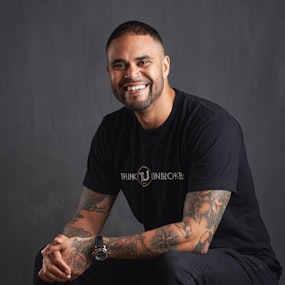
Michael Unbroken
Coach
Michael is an entrepreneur, best-selling author, speaker, coach, and advocate for adult survivors of childhood trauma.
Welcome to The Think Unbroken Podcast!
Here are some of my favorite recent guests!



























